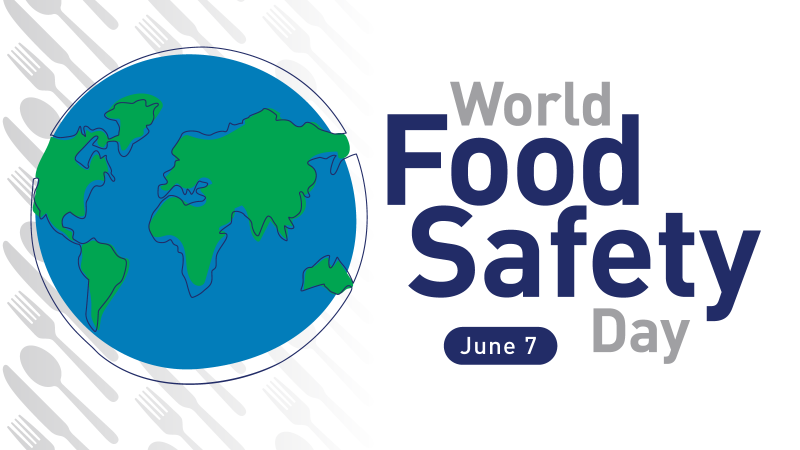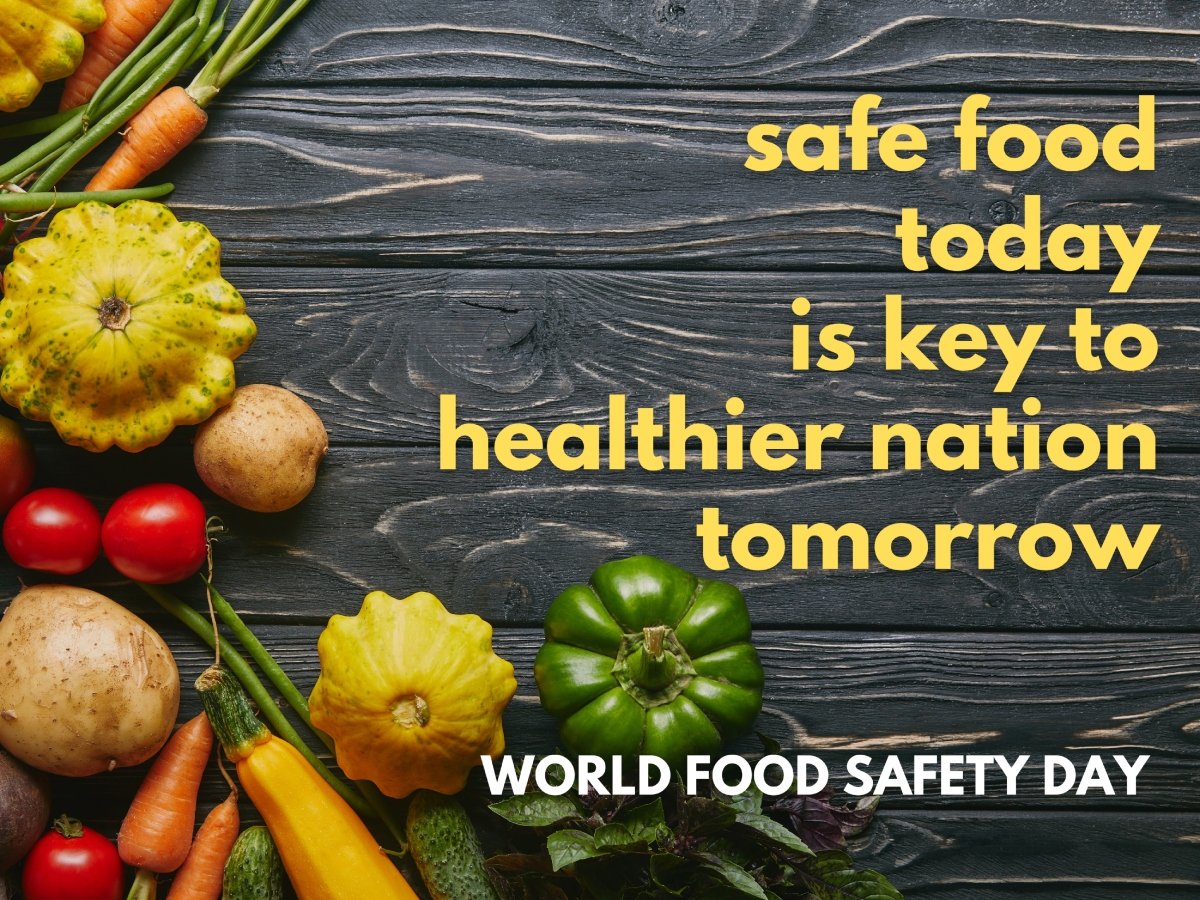World Food Safety Day 2023: Ensuring Safe and Nutritious Food for All
Introduction:
World Food Safety Day is observed on June 7th every year to raise awareness about the importance of food safety and the need to prevent, detect, and manage foodborne risks. In 2023, this significant day is dedicated to emphasizing the global efforts to ensure safe and nutritious food for all.
Food safety is a critical global concern, affecting public health, economic development, and international trade. This day serves as a reminder of the importance of maintaining high standards in food production, handling, and consumption. Ensuring food safety helps prevent foodborne illnesses and contributes to improved nutrition and overall well-being.

The Importance of World Food Safety Day 2023: Ensuring Safe and Nutritious Food
Safeguarding Public Health:
Ensuring food safety is vital for safeguarding public health. Contaminated food can lead to foodborne illnesses, causing significant health risks, especially for vulnerable populations such as children, pregnant women, and the elderly. World Food Safety Day emphasizes the need to prevent, detect, and manage foodborne risks, ultimately protecting individuals and communities from the detrimental effects of unsafe food.
Promoting Economic Development:
Food safety plays a crucial role in promoting economic development. By maintaining high standards in food production, processing, and distribution, countries can enhance consumer trust and confidence in their food systems. This, in turn, stimulates domestic and international trade, boosts agricultural productivity, and supports the growth of food-related industries. World Food Safety Day serves as a reminder of the close relationship between food safety and economic prosperity.
Ensuring International Trade:
Global trade in food products has increased significantly in recent years. Adhering to stringent food safety regulations and standards is essential for facilitating smooth international trade. World Food Safety Day highlights the importance of harmonizing food safety measures across countries, promoting international cooperation, and ensuring that traded food meets the necessary safety requirements. This ensures consumer protection and fosters trust in imported and exported food items.
Combating Food Insecurity:
Food safety is intrinsically linked to food security. Contamination or unsafe handling of food can result in food losses, which exacerbate food scarcity and increase the risk of hunger and malnutrition. By prioritizing food safety, World Food Safety Day contributes to efforts aimed at achieving food security and reducing food waste. It emphasizes the need for safe and nutritious food for all individuals, regardless of their socio-economic status.
Empowering Consumers:
World Food Safety Day empowers consumers by raising awareness and providing them with knowledge about food safety practices. Individuals play a critical role in ensuring food safety in their homes, workplaces, and communities. By understanding the importance of proper food handling, storage, and hygiene, consumers can make informed choices and protect themselves from foodborne illnesses. The day promotes a culture of responsibility, encouraging consumers to demand safe and high-quality food, which, in turn, drives improvements in the overall food system.
Historical Context of World Food Safety Day: Advancing Food Safety Worldwide
Formation of Codex Alimentarius Commission:
In 1963, the Food and Agriculture Organization (FAO) and the World Health Organization (WHO) established the Codex Alimentarius Commission. Codex develops international food standards, guidelines, and codes of practice to protect consumer health and ensure fair practices in the food trade. This laid the foundation for international cooperation on food safety.
Emergence of Foodborne Disease Outbreaks:
Throughout the 20th century, several high-profile foodborne disease outbreaks occurred, leading to a growing recognition of the need for stronger food safety measures. Incidents such as the outbreak of salmonellosis in the United States in the 1980s and the BSE (mad cow disease) crisis in the 1990s highlighted the potential risks associated with unsafe food.
WHO Global Strategy for Food Safety:
In 2002, the WHO developed the Global Strategy for Food Safety, which aimed to reduce the burden of foodborne diseases worldwide. The strategy emphasized the importance of prevention, surveillance, and effective communication to ensure the safety of the food supply chain.
Establishment of World Food Safety Day:
In December 2018, the United Nations General Assembly adopted a resolution proclaiming June 7th as World Food Safety Day. The resolution acknowledged the importance of food safety in achieving the Sustainable Development Goals and called upon governments, international organizations, and other stakeholders to observe the day annually.
Annual Observance and Global Awareness:
Since its establishment, World Food Safety Day has been observed annually, raising global awareness about the importance of safe food. Each year, the day focuses on specific themes, highlighting different aspects of food safety and promoting collaborative efforts to address challenges and gaps in the food system.
Key Takeaways from “World Food Safety Day 2023”
| Serial Number | Key Takeaway |
|---|---|
| 1. | World Food Safety Day is observed on June 7th annually, aiming to raise awareness about food safety. |
| 2. | Ensuring food safety is crucial for safeguarding public health, promoting economic development, and trade. |
| 3. | Individuals play a significant role in practicing safe food handling and hygiene to prevent foodborne risks. |
| 4. | Technology advancements, such as blockchain and IoT, can enhance food safety through traceability and transparency. |
| 5. | World Food Safety Day contributes to combating food insecurity and promoting nutritious food for all. |
Conclusion:
World Food Safety Day 2023 serves as a reminder that food safety is a shared responsibility. It highlights the need for continued efforts to strengthen food safety systems, promote awareness, and empower individuals to make informed decisions. By working together, we can create a safer and healthier food environment for everyone.
Important FAQs for Students from this News
Q: What is the purpose of World Food Safety Day?
A: The purpose of World Food Safety Day is to raise awareness about the importance of food safety and to prevent, detect, and manage foodborne risks.
Q: How does World Food Safety Day contribute to public health?
A: World Food Safety Day contributes to public health by promoting safe food production, handling, and consumption, which helps prevent foodborne illnesses.
Q: What are some challenges in ensuring food safety?
A: Challenges in ensuring food safety include emerging foodborne risks, contamination incidents, and the globalization of food supply chains.
Q: What role do individuals play in food safety?
A: Individuals play a crucial role in food safety by practicing proper food handling, storage, and hygiene at home, contributing to the prevention of foodborne illnesses.
Q: How can technology enhance food safety?
A: Advancements in technology, such as blockchain, artificial intelligence, and the Internet of Things (IoT), can enhance food safety by enabling traceability, transparency, and rapid response to food safety incidents.
Some Important Current Affairs Links

















